#King and Queen of France
Explore tagged Tumblr posts
Text


Reign 2013-17
Mary and Francis
#mary stuart#francis de valois#adelaide kane#toby regbo#reign#season2#coronation#french throne#crowns#king and queen of france#mary×francis#frary OTP#face expression#royals#equals#aragorn and arwen#pianosy#b&w#lord of the rings
9 notes
·
View notes
Text
National Mother Goose Day
You may already be familiar with Mother Goose, the rhymes and tales that she spun. The little old lady who rode her goose, and has been a staple for many over the years. Much like The Brothers Grimm, Dr Seuss, Robert Munch, and Shel Silverstein. Yet, Mother Goose is something altogether. Mother Goose is that warm, fondly remembered family member. The one that shows up for family reunions,…
View On WordPress
#Always sign your work#America#Bertha#Blog#Books#Controversial#England#Fiction#France#French Monarchy#Harrowing Events#Harrowing Poetry#King and Queen of France#King of France#King Robert#Legends#Literary#Literary Blog#Literary Legends#Literary Myths#Literature#Monarchy#Mother Goose#Mystery Origins#Myths#Myths and Legends#Poems#Poet#Poetry#Queen Bertha
0 notes
Text
Tennis star, Naomi Osaka is a real one for this epic moment. Naomi, who is Haitian & Japanese, calls for Reparations for Haiti from France. If Naomi wasn't already one of my favorite tennis players and one of my favorite people, she'd sure be my favorite now! 👍🏽✊🏽🙏🏽🖤 This is not an act of "Wokeism" THIS is pure pride!
#naomi osaka#haiti#1804#free haiti#reparations#haitian revolution#france#black kings#black queens#kings and queens#black gods#gods#black men#african women#africa#african#black women#black girls#black queen#afro latinas#black history#black beauty#politics#afro latinos#black teachers#black entrepreneurship#black inventors#black fashion#black love#black tumblr
604 notes
·
View notes
Text
A central element of the myth of [Eleanor of Aquitaine] is that of her exceptionalism. Historians and Eleanor biographers have tended to take literally Richard of Devizes’s conventional panegyric of her as ‘an incomparable woman’. She is assumed to be a woman out of her time. […] Amazement at Eleanor’s power and independence is born from a presentism that assumes generally that the Middle Ages were a backward age, and specifically that medieval women were all downtrodden and marginalized. Eleanor’s career can, from such a perspective, only be explained by assuming that she was an exception who rose by sheer force of personality above the restrictions placed upon twelfth-century women.
— Michael R. Evans, Inventing Eleanor: The Medieval and Post-Medieval Image of Eleanor of Aquitaine
The idea of Eleanor’s exceptionalism rests on an assumption that women of her age were powerless. On the contrary, in Western Europe before the twelfth century there were ‘no really effective barriers to the capacity of women to exercise power; they appear as military leaders, judges, castellans, controllers of property’. […] In an important article published in 1992, Jane Martindale sought to locate Eleanor in context, stripping away much of the conjecture that had grown up around her, and returning to primary sources, including her charters. Martindale also demonstrated how Eleanor was not out of the ordinary for a twelfth-century queen either in the extent of her power or in the criticisms levelled against her.
If we look at Eleanor’s predecessors as Anglo-Norman queens of England, we find many examples of women wielding political power. Matilda of Flanders (wife of William the Conqueror) acted as regent in Normandy during his frequent absences in England following the Conquest, and [the first wife of Henry I, Matilda of Scotland, played some role in governing England during her husband's absences], while during the civil war of Stephen’s reign Matilda of Boulogne led the fight for a time on behalf of her royal husband, who had been captured by the forces of the empress. And if we wish to seek a rebel woman, we need look no further than Juliana, illegitimate daughter of Henry I, who attempted to assassinate him with a crossbow, or Adèle of Champagne, the third wife of Louis VII, who ‘[a]t the moment when Henry II held Eleanor of Aquitaine in jail for her revolt … led a revolt with her brothers against her son, Philip II'.
Eleanor is, therefore, less the exception than the rule – albeit an extreme example of that rule. This can be illustrated by comparing her with a twelfth century woman who has attracted less literary and historical attention. Adela of Blois died in 1137, the year of Eleanor’s marriage to Louis VII. […] The chronicle and charter evidence reveals Adela to have ‘legitimately exercised the powers of comital lordship’ in the domains of Blois-Champagne, both in consort with her husband and alone during his absence on crusade and after his death. […] There was, however, nothing atypical about the nature of Adela’s power. In the words of her biographer Kimberley LoPrete, ‘while the extent of Adela’s powers and the political impact of her actions were exceptional for a woman of her day (and indeed for most men), the sources of her powers and the activities she engaged in were not fundamentally different from those of other women of lordly rank’. These words could equally apply to Eleanor; the extent of her power, as heiress to the richest lordship in France, wife of two kings and mother of two or three more, was remarkable, but the nature of her power was not exceptional. Other noble or royal women governed, arranged marriages and alliances, and were patrons of the church. Eleanor represents one end of a continuum, not an isolated outlier.
#It had to be said!#eleanor of aquitaine#historicwomendaily#angevins#my post#12th century#gender tag#adela of blois#I think Eleanor's prominent role as dowager queen during her sons' reigns may have contributed to her image of exceptionalism#Especially since she ended up overshadowing both her sons' wives (Berengaria of Navarre and Isabella of Angouleme)#But once again if we examine Eleanor in the context of her predecessors and contemporaries there was nothing exceptional about her role#Anglo-Saxon consorts before the Norman Conquest (Eadgifu; Aelfthryth; Emma of Normandy) were very prominent during their sons' reigns#Post-Norman queens were initially never kings' mothers because of the circumstances (Matilda of Flanders; Edith-Matilda; and#Matilda of Boulogne all predeceased their husbands; Adeliza of Louvain never had any royal children)#But Eleanor's mother-in-law Empress Matilda was very powerful and acted as regent of Normandy during Henry I's reign#Which was a particularly important precedent because Matilda's son - like Eleanor's sons after him - was an *adult* when he became King.#and in France Louis VII's mother Adelaide of Maurienne was certainly very powerful and prominent during Eleanor's own queenship#Eleanor's daughter Joan's mother-in-law Margaret of Navarre had also been a very powerful regent of Sicily#(etc etc)#So yeah - in itself I don't think Eleanor's central role during her own sons' reigns is particularly surprising or 'exceptional'#Its impact may have been but her role in itself was more or less the norm
547 notes
·
View notes
Text



Danish Royal Family - The King and Queen take a ride on a 100% electric boat on the Seine with the Mayor of Paris in Paris, France (Photos by JACOVIDES-MOREAU) | April 02, 2025
#royaltyedit#theroyalsandi#the royals and i#frederik x#king frederik x#queen mary#king frederik x of denmark#queen mary of denmark#france state visit 2025#france april 2025#france 2025#jaovides-moreau#april 2025#2025#fm 2025#fm april 2025#fm edit#denmark 2025#denmark april 2025#denmark edit#danish royal family#my edit
83 notes
·
View notes
Text








TEAM GREEN AT THE BLACK CARPET FOR 'HOUSE OF THE DRAGON' S2 PREMIERE IN PARIS.
#house of the dragon#hotd#hotd s2#tv shows#team green#aemond targaryen#ewan mitchell#aemond one eye#aegon ii targaryen#king aegon ii targaryen#tom glynn carney#phia saban#queen helaena targaryen#helaena the dreamer#helaena targaryen#matthew needham#larys strong#otto hightower#rhys ifans#olivia cooke#queen alicent hightower#alicent hightower#fabien frankel#ser criston cole#hotd cast#hotd s2 premiere#paris france
216 notes
·
View notes
Text





King Frederik X and Queen Mary of Denmark start their state visit to France with a welcome ceremony in Paris 31 March 2025
48 notes
·
View notes
Text

After la Fronde, the liberty: she grew up, but maybe for the better
#artists on tumblr#anthro art#fandom#digital art#king louis xiii#dogtanian and the three muskehounds#louis xiii#cartoon art#dogtanianfando#cardinal richelieu#before and after#afterlife#waiting#queen of france#queen band#furry sfw#furry anthro#furry character#furry#sfw furry#furry art#anthropomorphic#furry fandom#furry oc#anthro#fursona#oc artist#oc artwork#oc x canon#oc rp
29 notes
·
View notes
Text
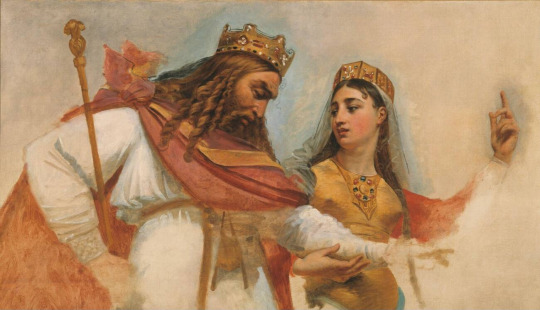
Antoine-Jean Gros (French, 1771-1835) Clovis et Clotilde, 1811 Musée des Beaux-Arts de la Ville de Paris, Petit Palais "Clovis et Clotilde" is a historical painting depicting the first Frankish king and his wife.
#Antoine-Jean Gros#French art#French#France#clovis et clotilde#1811#1800s#art#fine art#european art#classical art#europe#european#fine arts#oil painting#europa#mediterranean#traditional art#royal#royals#royalty#princess#king#queen#kiss curl#historical painting#king of france#frankish#germanic tribe#franks
27 notes
·
View notes
Text
That’s one small step for the ladies, one giant leap for the gold diggers 🙏🏾👏🏾🙌🏾 👸🏾
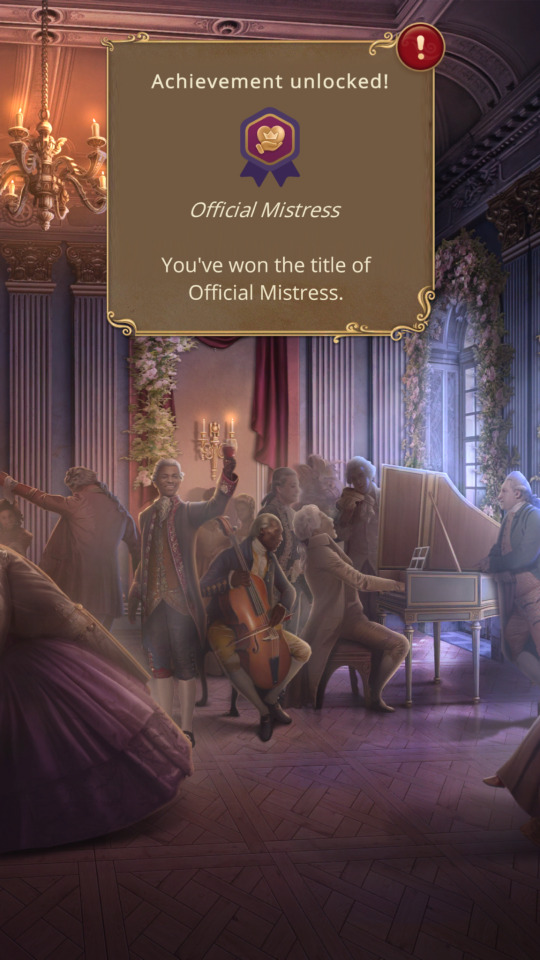
#rc#romance club#the things you got to do to get a bag#rc vying for versailles#rc vfv#rc king louis#future Queen of France#rc achievements
21 notes
·
View notes
Text


#matching icons#reign#frary#mary queen of scots#francis valois#mary stuart#francis king of france#long may she reign#my post
15 notes
·
View notes
Text
In March of 1939, King George VI and Queen Elizabeth hosted French President and Madame Lebrun on a State Visit to Britain. Here, the Lebruns make an appearance on the balcony of Buckingham Palace with the King & Queen and Princesses Elizabeth & Margaret, after arriving at the Palace by open landau in a grand procession.
British Pathe
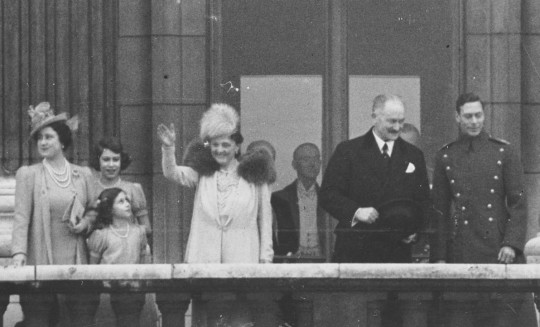
Can we just take a moment to talk about how incredibly delicious Bertie looks in that sumptuous bespoke Guards winter coat? Ooh-la-la!!!
Nobody wore a uniform better, IMHO! 😍
#king george vi#sumptuous bertie#queen elizabeth#1939#he just slays me#🎶 “cause every girl crazy ‘bout a sharp dressed man. 🎶#french state visit#president & madam lebrun#british royal family#buckingham palace#vive la france#🇫🇷#my post
13 notes
·
View notes
Text

14 November 2024









#marie antoinette#diamond necklace#queen marie antoinette#french queen#france#sotheby's#historical jewelry#guillotine#king louie XVI#french revolution#1700s#18th century#affair of the diamond necklace#scandal#jeanne de la motte#bond street#marquess of anglesey#anglesey family#coronation 1937#coronation 1953#queen elizabeth ll#king george VI#french history#history
25 notes
·
View notes
Text
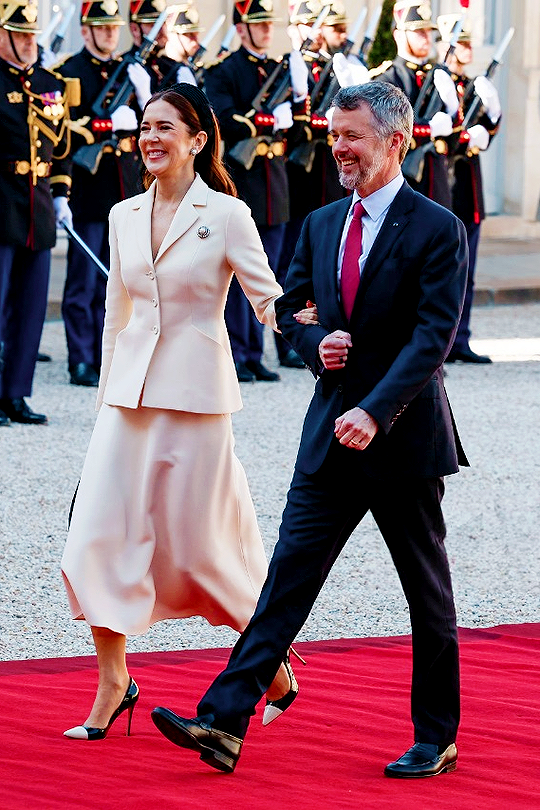
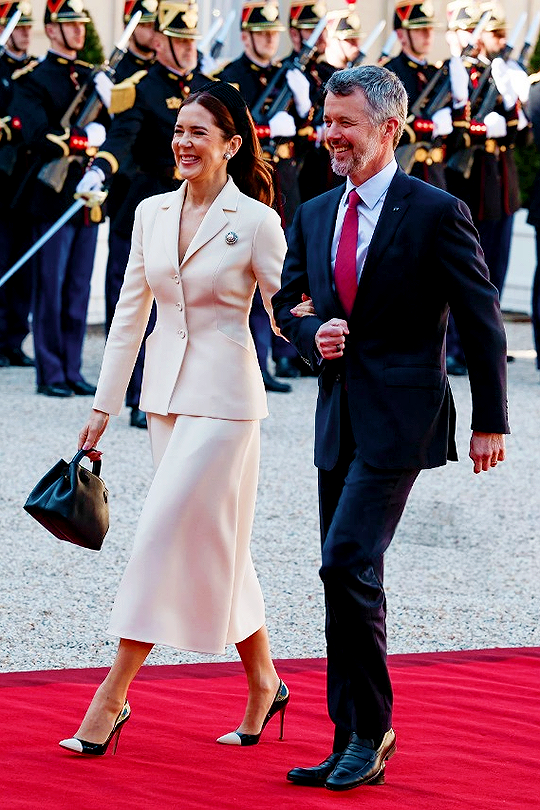
Danish Royal Family - The King and Queen arrives at the Elysee presidential palace on day one of their State Visit in France (Photo by Pierre Suu) | March 31, 2025
#royaltyedit#theroyalsandi#the royals and i#frederik x#king frederik x#queen mary#king frederik x of denmark#queen mary of denmark#france state visit 2025#pierre suu#france 2025#march 2025#2025#fm 2025#fm march 2025#fm edit#fred edit#mary edit#denmark 2025#denmark march 2025#danish royal family#my edit
87 notes
·
View notes
Text

Wedding of Maria de' Medici and Henry IV of France
Description: Maria de Medici's marriage by proxy with Henry IV of France, represented by Ferdinand I, Grand Duke of Tuscany.
Artist: Jacopo da Empoli (Italian, 1551–1640)
Date: 1600
Medium: Oil on canvas
Collection: Uffizi Gallery, Florence, Italy
Wedding of Maria de Medici
Marie de Medici became queen of France upon marrying King Henri IV in October 1600. She was his second wife. Henri had annulled his first marriage to Marguerite de Valois after converting to Catholicism in 1593. This was not the first union of French royalty and the powerful Florentine family; in fact Marguerite de Valois was one of the children of Catherine de Medici and Henri II of France, who had married in 1533. Marie was distantly related to Catherine and Marguerite, as she was descended from a different line of the Medici family.
The wedding of Henri IV and Marie de Medici was a proxy wedding, the term used when the bride or groom is not physically present for the marriage ceremony. Marie de Medici's uncle, Ferdinando, Grand Duke of Tuscany, (who had arranged the match) stood in for Henri IV at the ceremony in Florence. The Medici family members were renowned patrons of the arts, and Ferdinand was no exception: the nuptials were marked by a performance of the newly-invented dramatic art form of opera (Eurydice by Jacopo Peri and Giulio Caccini). Marie would have grown up well accustomed to artistic patronage through knowledge of the Medici family's collections and commissions.
#portrait#marriage#painting#oil on canvas#fine art#marriage ceremony#marie de medii#house of medici#king henry iv#queen of france#french monarchy#french empire#jacopo da empoli#french painter#french culture#costume#wedding ring#men#women#1600#17th century painting#artwork#french art
27 notes
·
View notes
Text


King Philippe of Belgium, Queen Mathilde of Belgium and Prince Gabriel of Belgium with French President Emmanuel Macron and First Lady Brigitte Macron as they attend a State dinner on the occasion of King Philippe of Belgium and Queen Mathilde of Belgium's State Visit in France, at the Presidential Elysée Palace in Paris, France -October 14th 2024.
📷 : Belgium Foreign Affairs, Foreign Trade and Development Cooperation / Vlad Vanderkelen.
#king philippe#queen mathilde#prince gabriel#prince gabriel of belgium#belgian royal family#belgium#2024#october 2024#emmanuel macron#brigitte macron#france#france 2024#paris#paris 2024#state visit belgium#state visit belgium 2024#royal children#my edit
20 notes
·
View notes